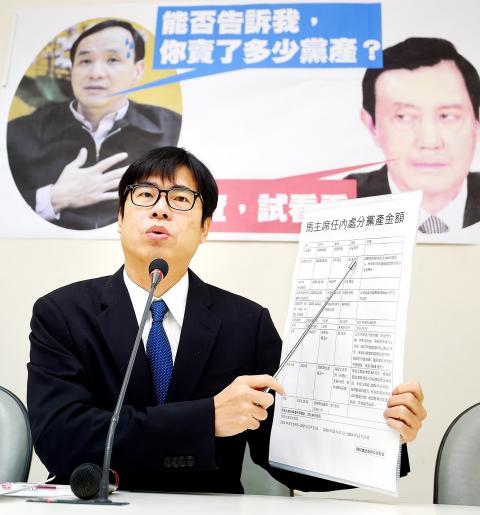New Taipei City Mayor Eric Chu (朱立倫) sparked a fracas when he said he had no idea what assets the Chinese Nationalist Party (KMT) holds as he registered for the KMT chairman election on Sunday.
However, in April 2000, news outlets reported that Chu, after attending a KMT Central Reform Committee meeting, said that KMT party assets amounted to about NT$100 billion (US$3.15 billion) in market value, including current assets — savings and securities — of NT$10 billion, fixed assets — land and properties — of NT$20 billion and investment net value of NT$70 billion.
Noting media reports from 2000, Democratic Progressive Party (DPP) Legislator Chen Chi-mai (陳其邁) said Chu has been “feigning ignorance” while knowing the scope of KMT holdings.

Photo: Fang Pin-chao, Taipei Times
If Chu knows of a discrepancy between past and present amounts, he would have to investigate how assets had disappeared and thereby “face the quandary of settling accounts with President Ma Ying-jeou (馬英九),” Chen said.
His feigned ignorance was to avoid this dilemma, Chen said.
“However, what kind of reform is this is?” Chen added.
Chen said Ma had sold KMT party assets cheaply during his tenure as chairman, and the KMT Administration and Management Committee had become Ma’s personal coffer, with the transactions not reported to the KMT Central Standing Committee.
Chu would not dare hold accountable the person who allegedly mishandled the assets, so he is pretending to have amnesia, Chen said.
Taiwan Solidarity Union Legislator Lai Chen-chang (賴振昌) asked whether Chu is “suffering amnesia or lying.”
“Is the 2000 Chu a different person from the 2014 Chu?” he asked.
Chu did not respond to the allegations raised by the legislators.
New Taipei City Government spokesman Lin Chieh-yu (林芥佑) said no further comment would be made on the issue.
Records show that the KMT Central Reform Committee had meetings following the party’s loss in the 2000 presidential election and the party’s Business and Investment Management Committee then reported that the party’s assets had been divided into six categories: bank savings, securities, land and houses, US dollar-denominated bonds, funds for party affairs and long-term investments in party-run enterprises.
The committee’s report said that KMT assets’ total value had increased from the NT$38,516,990,000 that it had registered with the local district in March 1994 to NT$73,492,600,000 in March 2000.
The investment committee said the increase was the result of adjustments made to the net values of the holding companies of party-run enterprises.
Chu said the party assets then amounted to about NT$100 billion at market value.
According to data filed by the KMT with the Ministry of the Interior’s Department of Civil Affairs last year, the party’s current assets had shrunk to NT$2.46 billion, fixed assets to NT$1.3 billion and investment business to NT$23.29 billion, with the total amounting to NT$26.8 billion. In other words, a total of NT$73.2 billion in asset value vaporized within 13 years.
Lai said that insofar as Chu has emphasized the need for the party’s finances to be made transparent, he would have to clarify the flow of the disappeared NT$70 billion and make transparent the past finances.
The Ministry of the Interior made public in July the party’s financial statements for last year, which show KMT assets totaling NT$26.8 billion, with the party’s affairs funding income at about NT$1.55 billion — topping the chart listing all political parties.

US President Donald Trump said "it’s up to" Chinese President Xi Jinping (習近平) what China does on Taiwan, but that he would be "very unhappy" with a change in the "status quo," the New York Times said in an interview published yesterday. Xi "considers it to be a part of China, and that’s up to him what he’s going to be doing," Trump told the newspaper on Wednesday. "But I’ve expressed to him that I would be very unhappy if he did that, and I don’t think he’ll do that," he added. "I hope he doesn’t do that." Trump made the comments in

NOT AN OPENING: Trump’s violation of international law does not affect China’s consideration in attacking Taiwan; Beijing lacks capability, not precedent, an official said Taiwanese officials see the US’ capture of the president of Venezuela as a powerful deterrent to Beijing’s aggression and a timely reminder of the US’ ability to defeat militaries equipped with Chinese-made weapons. The strikes that toppled Venezuelan President Nicolas Maduro signaled to authoritarian leaders, including Chinese President Xi Jinping (習近平), US President Donald Trump’s willingness to use military might for international affairs core to US interests, one senior official in Taipei’s security circle said. That reassured Taiwan, the person said. Taipei has also dismissed the idea that Trump’s apparent violation of international law could embolden Beijing, said the official, who was not

A cold surge advisory was today issued for 18 cities and counties across Taiwan, with temperatures of below 10°C forecast during the day and into tonight, the Central Weather Administration (CWA) said. New Taipei City, Taipei, Taoyuan and Hsinchu, Miaoli and Yilan counties are expected to experience sustained temperatures of 10°C or lower, the CWA said. Temperatures are likely to temporarily drop below 10°C in most other areas, except Taitung, Pingtung, Penghu and Lienchiang (Matsu) counties, CWA data showed. The cold weather is being caused by a strong continental cold air mass, combined with radiative cooling, a process in which heat escapes from

Snow this morning fell on Alishan for the first time in seven years, as a strong continental cold air mass sent temperatures plunging across Taiwan, the Central Weather Administration (CWA) said. The Alishan weather station, located at an elevation of about 2,200m in central Taiwan, recorded snowfall from 8:55am to 9:15am, when the temperature dropped to about 1°C, the CWA said. With increased moisture and low temperatures in the high-altitude Alishan area, the conditions were favorable for snow, CWA forecaster Tsai Yi-chi (蔡伊其) said. The last time snow fell at the Alishan weather station was on Jan. 10, 2018, while graupel fell there